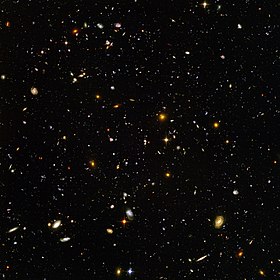Everything

Everything, every-thing, or every thing, is all that
Scope
In ordinary conversation, everything usually refers only to the totality of things relevant to the subject matter.[1] When there is no expressed limitation, everything may refer to the universe, or the world.
The universe is most commonly defined as everything that physically exists: the entirety of
Especially in a
In theoretical physics
In
There have been many theories of everything proposed by
Based on theoretical holographic principle arguments from the 1990s, many physicists believe that 11-dimensional M-theory, which is described in many sectors by matrix string theory, and in many other sectors by perturbative string theory, is the complete theory of everything. Other physicists disagree.
In philosophy
In philosophy, a theory of everything or TOE is an ultimate, all-encompassing explanation of
See also
- Alpha and Omega
- Infinity
- Modal collapse – Concept in modal logic
- Nothing
- Something (concept)
- Trivialism, the logical theory that every statement (or everything) is true.
References
- ^ a b "everything". Merriam-Webster Online Dictionary. Retrieved 2008-06-17.
- ^ a b c Rescher, Nicholas (2006a). "Holistic Explanation and the Idea of a Grand Unified Theory". Collected Papers IX: Studies in Metaphilosophy.
- ^ a b Rescher, Nicholas (2006b). "The Price of an Ultimate Theory". Collected Papers IX: Studies in Metaphilosophy.
- ^ a b Walker, Mark Alan (March 2002). "Prolegomena to Any Future Philosophy". Journal of Evolution and Technology Vol. 10.
